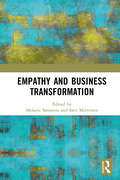- Table View
- List View
Emotions in Cultural Context (International and Cultural Psychology)
by Girishwar Misra Indiwar MisraThis book approaches emotion from a cultural perspective in applied contexts, consolidating new research that examines the interface of emotions with various aspects of human life. It provides insights into the vibrant and growing field of emotion research by rearticulating the distinction and interrelationships of the trilogy of mind consisting of cognition, affection and conation. It brings into focus indigenous and culturally relevant conceptualizations of emotion processes. Among the topics covered: Emotions at work: applications of emotional intelligenceIndian perspectives on youth, compassion, and moral well-beingParental emotion regulationstrategiesRole of emotions in construction of social identities Emotions in Cultural Context offers an up-to-date exploration of recent work in psychology of emotions.
Emotions in Culture and Everyday Life: Conceptual, Theoretical and Empirical Explorations (Classical and Contemporary Social Theory)
by Michael Hviid JacobsenThis volume describes and analyses a series of emotions prevalent in everyday life and culture, with each chapter exploring the main facets of a particular emotion and considering the ways in which it manifests itself in and informs our culture and lives. Considering our expression, conception, management and sanctioning of emotions, and the ways in which these have changed over time, as well as the ways in which we can theorise particular emotional states, authors ask how certain emotions are linked to culture and society and what roles they play in politics and contemporary life. With examples and case studies taken from research into media, culture and social life, Emotions in Culture and Everyday Life will appeal to scholars of sociology, anthropology, psychology, media and cultural studies and philosophy with interests in the emotions.
Emotions in Digital Interactions: Ethnopsychologies of Angels' Mothers in Online Bereavement Communities
by Irene Rafanell Maja SawickaCombining the conceptual tools of interactionist and social constructionist positions, this book presents an in-depth investigation of emotions in digital interactions. Through the central case study of online bereavement communities for women who have suffered perinatal loss, this volume highlights the significance of affective sanctioning as constitutive of group dynamics and practice. The authors chart the emergence of a new ethnopsychology of motherhood—the category of ‘Angels’ Mothers’—arising from the localized practices of a community whose experience of grief is otherwise disenfranchised. Through their detailed theoretical exploration of the centrality of micro-situational dynamics, alongside the rich empirical illustration of collectively shared feeling rules and norms, Rafanell and Sawicka develop a naturalistic approach to the analysis of empirical data, providing insights for policy-making interventions.
Emotions in Finance
by Jocelyn PixleyMoney is a promise with future benefits or dangers that are unknowable and incalculable. The financial sector is an attempt to beat uncertainty by speculating on whether prices will rise or fall. No matter how often the folly of this opportunism is shown through crisis after crisis of trust, efforts to defeat uncertainty persist. Yet uncertainty is unavoidable. Squeezed in one place, it emerges in another. Based on extensive interviews with leading actors in the financial sector, this book argues that the only way to cope with uncertainty is by relying on emotions and values. It presents an original explanation of how booms and busts arise from internal disputes over the emotions of trust between global financial corporations. Confidence and suspicion alternate between which strategy may beat competitors and who is cheating whom. Just as the first edition warned of continuing dangers in finance's betrayal of society's trust, this new edition provides a sociological explanation of how these irrational quests for certainty contributed to the current financial crisis in the credibility of money.
Emotions in Late Modernity (Routledge Studies in the Sociology of Emotions)
by Alberto Bellocchi Roger Patulny Sukhmani Khorana Jordan McKenzie Michelle Peterie Rebecca E. OlsonThis international collection discusses how the individualised, reflexive, late modern era has changed the way we experience and act on our emotions. Divided into four sections that include studies ranging across multiple continents and centuries, Emotions in Late Modernity does the following: Demonstrates an increased awareness and experience of emotional complexity in late modernity by challenging the legal emotional/rational divide; positive/negative concepts of emotional valence; sociological/ philosophical/psychological divisions around emotion, morality and gender; and traditional understandings of love and loneliness. Reveals tension between collectivised and individualised-privatised emotions in investigating ‘emotional sharing’ and individualised responsibility for anger crimes in courtrooms; and the generation of emotional energy and achievement emotions in classrooms. Debates the increasing mediation of emotions by contrasting their historical mediation (through texts and bodies) with contemporary digital mediation of emotions in classroom teaching, collective mobilisations (e.g. riots) and film and documentary representations. Demonstrates reflexive micro and macro management of emotions, with examinations of the ‘politics of fear’ around asylum seeking and religious subjects, and collective commitment to climate change mitigation. The first collection to investigate the changing nature of emotional experience in contemporary times, Emotions in Late Modernity will appeal to students and researchers interested in fields such as sociology of emotions, cultural studies, political science and psychology.
Emotions in Organization Theory (Elements in Organization Theory)
by Charlene Zietsma Madeline Toubiana Maxim Voronov Anna RobertsEmotions are central to social life and thus they should be central to organization theory. However, emotions have been treated implicitly rather than theorized directly in much of organization theory, and in some literatures, have been ignored altogether. This Element focuses on emotions as intersubjective, collective and relational, and reviews structuralist, people-centered and strategic approaches to emotions in different research streams to provide one of the first broad examinations of emotions in organization theory. Charlene Zietsma, Maxim Voronov, Madeline Toubiana and Anna Roberts provide suggestions for future research within each literature and look across the literatures to identify theoretical and methodological considerations.
Emotions in Organizational Behavior
by Neal M. Ashkanasy Wilfred J. Zerbe Charmine E.J. HärtelThis edition was conceived and compiled to meet the need for a comprehensive book for practitioners, academics, and students on the research of emotions in organizational behavior. The book is the first of its kind to incorporate organizational behavior and bounded emotionality. The editors' primary aim is to communicate the research presented at the bi-annual International Conference on Emotions and Organizational Life to a wider audience. This edition looks at the range of research on emotions within an organizational behavior framework; organized in terms of the individual, interpersonal, and organizational levels. Particular emphasis has been placed on obtaining the leading research in the international sphere. This book is intended to be useful to the student of organizational behavior, as well as to the managers of organizations.
Emotions in Politics: The Affect Dimension in Political Tension
by Nicolas DemertzisPrompted by the 'affective turn' within the entire spectrum of the social sciences, this books brings together the twin disciplines of political psychology and the political sociology of emotions to explore the complex relationship between politics and emotion at both the mass and individual level with special focus on cases of political tension.
Emotions in Rituals and Performances: South Asian and European Perspectives on Rituals and Performativity
by Axel Michaels; Christoph WulfChallenging the idea that rituals are static and emotions irrational, the volume explores the manifold qualities of emotions in ritual practices. Focusing explicitly on the relationship between emotions and rituals, it poses two central questions. First, how and to what extent do emotions shape rituals? Second, in what way are emotions ritualized in and beyond rituals? Strong emotions are generally considered to be more spontaneous and uncontrolled, whereas ritual behaviour is regarded as planned, formalized and stereotyped, and hence less emotional. However, as the volume demonstrates, rituals often reveal strong emotions among participants, are motivated by feelings, or are intended to generate them. The essays discuss the motivation for rituals; the healing function of emotions; the creation of new emotions through new media; the aspect of mimesis in the generation of feelings; individual, collective, and non-human emotions; the importance of trance and possession; staged emotions and emotions on stage; emotions in the context of martyrdom; emotions in Indian and Western dance traditions; emotions of love, sorrow, fear, aggression, and devotion. Furthermore, aesthetic and sensory dimensions, as well as emic concepts, of emotions in rituals are underscored as relevant in understanding social practice.
Emotions in Social Psychology: Essential Readings
by W. Gerrod ParrottSocial psychology evolves around emotions. Not only has social psychology contributed enormously to theory and research on the nature of emotions, it also has emotions at the heart of its basic subject matter, from attitudes to aggression.
Emotions in a Digital World: Social Research 4.0
by Adrian ScribanoThis book presents an introduction to strategies for qualitative digital social research on emotions in a digital world. The book emphasizes the connections that exist between emotional ecologies, emotions as texts, and the virtual / mobile / digital world that brings us closer to a hermeneutics of the practices of feeling. In the context of ‘Society 4.0’, the book explores: Changes in the organization of daily life and work in virtual, mobile and digital environments. The impact of apps and social networks on sensations, emotions and sensibilities. Necessary changes in social research to employ the power of these apps and networks for social enquiry. As such, this book shares a set of social inquiry practices developed and applied to capture and understand emotions today. It should be considered as a first step in a long journey of exploring the close connections between sensibilities, emotions, and social research methodology. The book will appeal to students and instructors of emotion studies from across the social sciences, including sociology, psychology, organization studies, ethnography, history, and political science.
Emotions through Literature: Fictional Narratives, Society and the Emotional Self (Classical and Contemporary Social Theory)
by Mariano LongoEngaging with the wide sociological literature on emotions, this book explores the social representation of emotions, their management and their effects by making reference to creative sources. With a specific focus on literary narrative, including the works of figures such as Dante, Austen, Manzoni, Tolstoy and Kundera, the author draws out the capacity of literary works to describe and represent both the external aspects of social relations and the inner motivations of the involved actors. An interdisciplinary study that combines sociology, narratology, philosophy, historical analysis and literary criticism, Emotions through Literature invites us to re-think the role of emotions in sociological analysis, employing literary narratives to give plausible intellectual responses to the double nature of emotions, their being both individual and social.
Emotions, Community, and Citizenship: Cross-Disciplinary Perspectives
by James Mckee Constantine Vassiliou Kiran Banerjee Rebecca Kingston Yi-Chun ChienEmotions are at the very heart of individual and communal actions. They influence our social and interpersonal behaviour and affect our perspectives on culture, history, politics, and morality. Emotions, Community, and Citizenship is a pioneering work that brings together scholars from an array of disciplines in order to challenge and unite the disciplinary divides in the study of emotions. These carefully selected studies highlight how emotions are studied within various disciplines with particular attention to the divide between naturalistic and interpretive approaches. The editors of this volume have provided a nuanced and insightful introduction and conclusion which provide not only an overarching commentary but a framework for the interdisciplinary approach to emotion studies.
Emotions, Consciousness-Raising and Feminisms in the Global South: On Building Solidarity (Routledge Studies in the Sociology of Emotions)
by Gabriela Silva LoureiroThis book is about the role of emotions in the creation and dissipation of feminist collectives and grapples with difficult questions that have been circulating for a while in activist circles but are far from answered. What are the emotions involved in building and sustaining solidarity? What can we learn from previous “waves” of feminist activism, and what is worth saving in social media activism today?These questions are tackled via the discourse analysis of hashtagged posts of two popular feminist hashtags in Brazil (#PrimeiroAssédio and #MeuAmigoSecreto) and interviews with Brazilian feminist actors. But instead of merely analysing the content of the hashtags or over-celebrating aesthetics, I interpret them as empirical evidence of the emotional life of varied feminisms and therefore useful to reflect upon historical build-ups and dissipation of solidarity.The unique feature of the book is making a bridge between sociology of emotions, feminist theory, and decolonial, Black, and Global South literature and praxis that articulate solidarity based on principles of difference instead of sameness. This book will be of interest to students, scholars, teachers, activists, and community members interested in the emotions involved in building and sustaining feminist solidarity from a non-Western perspective.
Emotions, Embodied Cognition and the Adaptive Unconscious: A Complex Topography of the Social Making of Things (Complexity in Social Science)
by John A. SmithEmotions, Embodied Cognition and the Adaptive Unconscious argues for the need to consider many other factors, drawn from disciplines such as socio-biology, evolutionary psychology, the study of the emotions, the adaptive unconscious, the senses and conscious deliberation in analysing the complex topography of social action and the making of things. These factors are taken as ecological conditions that shape the contemporary expression of complex societies, not as constraints on human plasticity. Without ‘foundations’, complex society cannot exist nor less evolve. This is the familiar pairing from complexity theory: path dependency and dynamic emergence. Inter-disciplinary and complexity perspectives need to be incorporated into the social sciences. Routinely, sociologists think of social phenomena as a distinct field, expressed in the term: the ‘social construction of’ without apparent need to refer to other material, biological, psychological, material or ecological conditions or agents. This book shows how the familiar sociological dynamics of identity, solidarity, differentiation and communication are shaped through the persistent interaction of unconscious and affective processing with conscious deliberation in newly emergent contexts. It is this re-expression, not the surpassing, of human characteristics in contemporary social action that needs to re-inform a complex, ecological approach to the theory and methodologies of the social sciences. The book is intended for a postgraduate/research audience and doctoral students to introduce and synthesise inter-disciplinary contributions to research into complexity theory in the social sciences.
Emotions, Everyday Life and Sociology (Classical and Contemporary Social Theory)
by Michael Hviid JacobsenThis volume explores the emotions that are intricately woven into the texture of everyday life and experience. A contribution to the literature on the sociology of emotions, it focuses on the role of emotions as being integral to daily life, broadening our understanding by examining both ‘core’ emotions and those that are often overlooked or omitted from more conventional studies. Bringing together theoretical and empirical studies from scholars across a range of subjects, including sociology, psychology, cultural studies, history, politics and cognitive science, this international collection centres on the ‘everyday-ness’ of emotional experience.
Emotions, Language and Identity on the Margins of Europe
by Kyra GiorgiWhen a word describing an emotion is said to be untranslatable, is that emotion untranslatable also? This unique study focuses on three word-concepts on the periphery of Europe, providing a wide-ranging survey of national identity and cultural essentialism, nostalgia, melancholy and fatalism, the production of memory and the politics of hope.
Emotions: A Social Science Reader (Routledge Student Readers)
by Paul Stenner Monica GrecoAre emotions becoming more conspicuous in contemporary life? Are the social sciences undergoing an an 'affective turn'? This Reader gathers influential and contemporary work in the study of emotion and affective life from across the range of the social sciences. Drawing on both theoretical and empirical research, the collection offers a sense of the diversity of perspectives that have emerged over the last thirty years from a variety of intellectual traditions. Its wide span and trans-disciplinary character is designed to capture the increasing significance of the study of affect and emotion for the social sciences, and to give a sense of how this is played out in the context of specific areas of interest. The volume is divided into four main parts: universals and particulars of affect embodying affect political economies of affect affect, power and justice. Each main part comprises three sections dedicated to substantive themes, including emotions, history and civilization; emotions and culture; emotions selfhood and identity; emotions and the media; emotions and politics; emotions, space and place, with a final section dedicated to themes of compassion, hate and terror. Each of the twelve sections begins with an editorial introduction that contextualizes the readings and highlights points of comparison across the volume. Cross-national in content, the collection provides an introduction to the key debates, concepts and modes of approach that have been developed by social scientist for the study of emotion and affective life.
Emotions: Essays on Emotion Theory
by Joseph A. Sergeant Stephanie H. M. van Goozen Nanne E. van de PollBased upon lectures presented at an invitational colloquium in honor of Nico Frijda, this collection of essays represents a brief and up-to-date overview of the field of emotions, their significance and how they function. For most, emotions are simply what we feel, giving our lives affective value. Scientists approach emotions differently -- some considering the "feeling" aspect to be of little relevance to their research questions. Some investigators consider emotions from a phenomenological perspective, while others believe that the psychophysiological bases of the emotions are of prime importance, and still others observe and study animals in order to generate hypotheses about human emotions. Containing essays which represent each of these approaches, this book is in one sense a heterogenous collection. Nevertheless, the variety of approaches and interests come together, since these scholars are all operating from a more or less cognitive psychological orientation and use the same conceptual reference scheme. Written by experts in their own area, the essays reflect the richness of research in emotions. Whether these approaches and opinions can be harmonized into a single theory of emotions is a question which the future will have to answer.
Emotionsorientierte Konfliktbearbeitung: Gestärkter, geklärter, verbundener in der Führung (essentials)
by Désirée Rehnert Elisa Streuli Sidal Alisa WebbKonflikte sind ständige Begleiter in unserer Arbeitswelt. Sie weisen auf Schwachstellen der Organisation hin und zeigen Weiterentwicklungsmöglichkeiten auf. Gleichzeitig sind sie für die Beteiligten oft enorm belastend. Dieses Buch präsentiert anhand konkreter Praxisbeispiele Modelle und Werkzeuge zur effektiven Konfliktbewältigung aus der Führungsrolle. Profitieren Sie von fundierten Strategien der Emotionsregulation und der wirksamen Kommunikation. Auf diese Weise gelingt es Ihnen, Konflikte lösungsorientiert zu bearbeiten und sie als Chance für eine geklärte und gestärkte Zusammenarbeit zu nutzen.
Empathy Beyond US Borders: The Challenges of Transnational Civic Engagement (Cambridge Studies in Social Theory, Religion and Politics)
by Gary J. Adler, JrHow do middle-class Americans become aware of distant social problems and act against them? US colleges, congregations, and seminaries increasingly promote immersion travel as a way to bridge global distance, produce empathy, and increase global awareness. But does it? Drawing from a mixed methods study of a progressive, religious immersion travel organization at the US-Mexico border, Empathy Beyond US Borders provides a broad sociological context for the rise of immersion travel as a form of transnational civic engagement. Gary J. Adler, Jr follows alongside immersion travelers as they meet undocumented immigrants, walk desert trails, and witness deportations. His close observations combine with interviews and surveys to evaluate the potential of this civic action, while developing theory about culture, empathy, and progressive religion in transnational civic life. This timely book describes the moralization of travel, the organizational challenges of transnational engagement, and the difficulty of feeling transformed but not knowing how to help.
Empathy and Business Transformation
by Satu Miettinen Melanie SarantouDue to its potential transformative nature, empathy has increasingly received attention in business, psychology, neuroscience, education, medicine, social sciences and design, to mention only a few. During the last two decades, discussions about the role of empathy in design and creative research and practice have developed, with empathy perceived as a key instrument in human-centred design and design thinking. This book revisits the powerful concept of empathy in the new post-pandemic era in which ubiquitous digitalisation presents challenges to retaining human-centredness when developing products and services. The book presents a practical four-step approach to the challenges presented concerning how organisations can turn from merely feeling empathy with or for people, to actions of empathy and compassion that can be implemented with and by communities. A wide range of organisations and organisational settings can benefit from the presented case studies and research methods. Through them, the book explores how to discover, share and act with empathy and compassion in the new digitally driven post-pandemic era to innovate across a wide range of organisations, including for-profit and not-for-profit businesses and those in the public and third sectors. This edited volume will appeal to global researchers in the fields of product and service design and digital, social innovation, as well those interested in organisational development. The practical, interdisciplinary nature of the book and innovative four-step approach will also appeal to upper-level students.
Empathy and Concern with Negative Evaluation in Intergroup Relations: Implications for Designing Effective Interventions (Elements in Applied Social Psychology)
by Jacquie D. VorauerThe widespread belief in the benefits of empathy and its healing power is evident in public discourse and across diverse news and social media outlets around the world. Yet research reveals that empathy can sometimes have adverse effects on individuals' intergroup attitudes and behavior. A link between empathy and concerns with negative evaluation helps explain why empathy can backfire. Accordingly, using the minimization of evaluative concerns as an organizing principle, the author makes recommendations regarding when and how to encourage empathy in intergroup contexts, so that its potential to foster stronger social bonds across group boundaries can be fully realized.
Empathy and History: Historical Understanding in Re-enactment, Hermeneutics and Education (Making Sense of History #35)
by Tyson RetzSince empathy first emerged as an object of inquiry within British history education in the early 1970s, teachers, scholars and policymakers have debated the concept’s role in the teaching and learning of history. Yet over the years this discussion has been confined to specialized education outlets, while empathy’s broader significance for history and philosophy has too often gone unnoticed. Empathy and History is the first comprehensive account of empathy’s place in the practice, teaching, and philosophy of history. Beginning with the concept’s roots in nineteenth-century German historicism, the book follows its historical development, transformation, and deployment while revealing its relevance for practitioners today.
Empathy-Based Ethics: A Way to Practice Humane Medicine
by David Ian JeffreyThis book explores a new way of applying clinical ethics. Empathy-based ethics is based on the patient–doctor relationship and seeks to encourage a more humane form of medical practice. The author argues that the current emphasis on the biomedical model of medicine and a detached concern form of professionalism have damaged the patient–doctor relationship. He investigates examples of the dehumanization of patients and demonstrates a contrasting view of humane care. The book presents empathy as a relational construct - it provides an in-depth analysis of the process of empathizing. It discusses an empathy-based ethics approach underpinned by clinical examples of the practical application of this new approach. It suggests how empathy-based ethics can be embedded in clinical practice, medical education and research. The book concludes by examining the challenges in implementing such an approach and looks to a future which redresses the current imbalance between biomedical and psychosocial approaches to medicine.
























